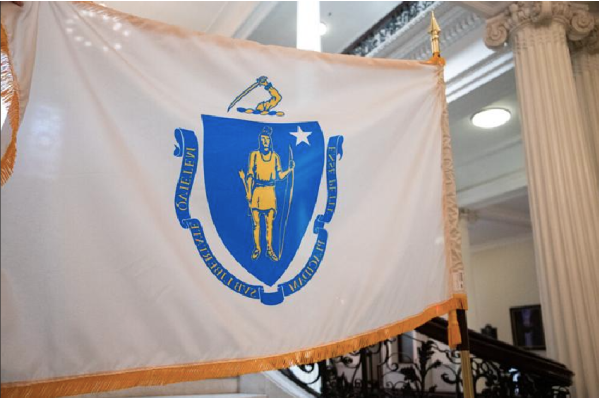May 22, 2024

Massachusetts residents have a rare opportunity to join in and advance a common project of hope: reimagining the flag and state seal of Massachusetts. Our flag and seal matter because the idea that representation matters is a cornerstone of our country: “No taxation without representation” was the rallying cry that served American colonists as an argument for liberation from English rule.
Yet, in 2024, the seal and flag do not represent our state accurately. It can be argued that those symbols in fact misrepresent Massachusetts and its people. The current flag and seal of our state are rooted in fear.
The City of Boston shares a rich history with modern tribal nations such as the Massachusett Tribe at Ponkapoag, whose members inhabited this area for thousands of years before the first British settlers arrived in 1630. Since then, Massachusetts has had different flags and seals. The current ones were last updated, without any public input from its residents, in 1898 and again in 1971.
Our current flag features an arm with a sword over the figure of a Native American and the motto Ense petit placidam sub libertate quietem (By the sword we seek peace, but peace only under liberty). Both symbols celebrate the violence inflicted on Native American populations and demean and harm their history and dignity. In 2024, these symbols do not represent our contemporary commitment and aspiration to peace, justice, liberty, and equality for all. They fail to register and represent our hope for a better future. We can, and we should, do something about it.
In 2021, then-Gov. Baker appointed a special commission to examine and study the seal and motto. Two years later, the commission recommended that the state create a new design for both and that “a new seal should be commissioned through a public request for proposals that seeks a professional designer.” It is now up to Massachusetts residents and their political representatives to move forward with this plan without further delay.
The Boston Human Rights Commission recently approved a resolution calling upon policymakers to rise to the occasion and to facilitate the process by explicitly supporting the commission’s report. The resolution advocates for a public and inclusive design process that would engage a diverse group of residents, including Native American tribes, artists, historians, educators, and the broader public. The idea would be to foster a shared vision for a flag and seal that represent our hope, our contemporary principles, and aspirations as a Commonwealth committed to human rights.
Readers can start by reaching out to their local representatives at City Hall – Mayor Wu and the City Council – as well as to state Sen. Nick Collins and state Rep. Antonio Cabral, members of the Special Commission and, of course, to Gov. Healey. That is what the Boston Human Rights Commission has done.
I would like to end by offering my own suggestion. Our 1780 Constitution, the first in the nation, starts with the most powerful words in our history: “All men are born free and equal.” Because of those words, just three years after the Constitution was approved, Massachusetts officially abolished slavery. I imagine similar words as our next state motto: “All are born free and equal.” (Omnes liberi et pares nascuntur.) The idea is 244 years old, but it is still aspirational, revolutionary, and full of hope.
Reyes Coll-Tellechea, a Dorchester resident, is chair of the Boston Human Rights Commission.


